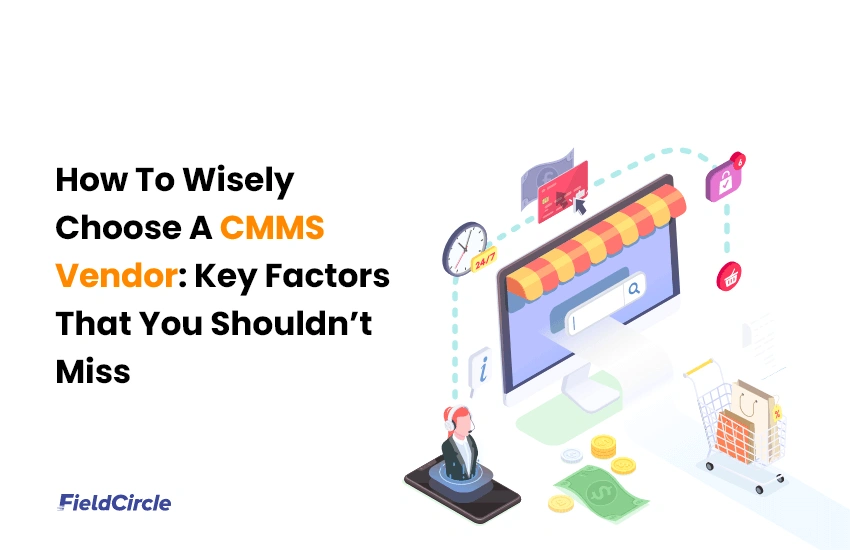How To Wisely Choose A CMMS Vendor: Key Factors That You Shouldn’t Miss

Effectively managing maintenance activities is a cornerstone of operational success in most industries. The computerized maintenance management system (CMMS) you choose can make or break this process.
With many CMMS software providers out there and emerging ones projecting to be the difference-makers, the process of choosing a trustworthy provider can land you in a deep water.
Here we guide you through this maze, offering insights into the nuanced criteria that should govern your decision-making. We delve into the key considerations that transcend the mere transactional aspect of vendor selection. We explore the intricacies of CMMS implementation, highlighting the critical role it plays in seamlessly integrating maintenance processes.
What are the key elements to consider when choosing a CMMS Vendor
The process of CMMS selection involves assessing a solution provider against various criteria, which we have discussed here. A provider would fit your niche’s needs only after it meets each of these criteria effectively.
Start by Gathering the Wisdom
The track record of a CMMS vendor holds paramount importance as it directly influences your choice in judging if the vendor would be suitable to meet your organizational needs. Having encountered and resolved diverse challenges in various industries, an experienced vendor brings a nuanced understanding of maintenance workflows. This is especially true when working with eco friendly vendors, who not only understand operational efficiency but also align with sustainability goals. Their experience can translate into a more refined and tailored CMMS solution, and help in addressing specific pain points and streamlining processes effectively.
So, to evaluate the experience of a CMMS provider, you must critically assess each of the following parameters:
- Past Implementations: How successfully the vendor has implemented its CMMS in organizations like yours. Vendors with such an experience are more likely to comprehend regulatory nuances, compliance standards, and specific maintenance challenges, ensuring the CMMS software is a strategic fit.
- Software Evolution: An experienced vendor demonstrates a commitment to continuous improvement. Evaluate the evolution of their software over time, including updates, feature enhancements, and responsiveness to changing technological landscapes.
- Client Relationships: Engage with existing clients to gauge the vendor’s long-term commitment and support. A vendor with extensive experience typically has established, enduring relationships with clients.
- Customization Skills: Experience enables vendors to customize the CMMS to align with unique organizational requirements. Assess their ability to tailor the system to accommodate varied workflows and integration needs.
While these are some factors that you must never overlook while analyzing the experience of a CMMS vendor, we shall discuss them further in the upcoming part.
Evaluate for the Specifics
You must choose a vendor that has dirtied its hand in tailoring a CMMS to your industry. So, while a CMMS may be filled with myriad features, they must be relevant to your business, which is where the need arises to consider some key questions. For instance, if you are a manufacturing business, then the following questions must be answered positively before you forge ties with a CMMS provider.
| Area | Questions to Consider |
| Work Order Management | How does the CMMS handle the creation and assignment of work orders for manufacturing processes? |
| Are there templates specifically designed for maintenance tasks related to production equipment and machinery? | |
| Can the system prioritize work orders based on production schedules and minimize downtime? | |
| Preventive Maintenance | What functionalities are available for setting up and managing preventive maintenance schedules for manufacturing machinery? |
| Can the CMMS automate routine inspections and preventive tasks to ensure continuous production? | |
| How does the CMMS support predictive maintenance for critical manufacturing equipment? | |
| Asset Management | Is there a robust asset registry for tracking and managing production equipment and machinery? |
| Can the CMMS provide real-time data on equipment efficiency, utilization, and performance? | |
| How does the system facilitate tracking the entire lifecycle of manufacturing assets, from acquisition to decommissioning? | |
| Inventory Control | What features are available for managing and controlling spare parts and inventory related to manufacturing processes? |
| Can the CMMS automate reordering processes for critical spare parts to avoid production delays? | |
| Is there a system for tracking and managing the consumption of spare parts during routine maintenance and repairs in manufacturing? |
Check for Adaptability
A well-established CMMS provider will offer seamless customization capabilities while committing to scalability and flexibility of the tool. Firstly, delve into the user interface customization capabilities, evaluating whether the CMMS allows users to modify visual elements like themes and layouts, as well as rearrange widgets for a personalized experience. Next comes configuration options as they are highly important. A comprehensive CMMS should provide a plethora of settings and preferences, so that users can fine-tune the system to align with their specific maintenance workflows.
A vendor must offer the seamless integration of CMMS with other tools and systems. It should support workflow customization that is essential for ensuring that maintenance processes can be adapted within the system to enhance efficiency.
In terms of data customization, features such as the ability to add or modify data fields and support for diverse data formats during import/export, contribute to a highly adaptable CMMS. A customizable reporting and analytics module is also pivotal, empowering users to create bespoke reports and dashboards for in-depth analysis.
User permissions and access control, including role-based access, are critical for managing different levels of authorization within the system. The CMMS’s upgradability is worth assessing to determine how easily it accommodates system updates without compromising on custom configurations. All these customization technicalities are important while ensuring that a CMMS supports a needed number of users and provides uninterrupted accessibility on mobile devices.
Verify Protocol Existence
As with the provider of any other software, it is imperative for providers to adhere to quality and security standards to ensure the reliability, functionality, and safety of the system and CMMS data. Compliance with these standards is essential for both the vendor and the businesses relying on the CMMS. Here is an overview of relevant quality and security standards that a CMMS vendor should adhere to. Check if the vendor you are shortlisting or partnering with are compliant with them:
Quality Standards:
| Standard | Why must a vendor follow it? |
| ISO 9001:2015 | Quality Management System focusing on process improvement, customer satisfaction, and defect prevention. |
| ISO/IEC 25010 | Software Product Quality standard covering functionality, reliability, usability, efficiency, maintainability, and portability. |
| IEEE/EIA 12207 | Framework for software life cycle processes, ensuring best practices in development and maintenance. |
| CMMI (Capability Maturity Model Integration) | Model providing a set of best practices for process improvement in software development and maintenance. |
Security Standards:
| Standard | Why must a vendor follow it? |
| ISO/IEC 27001 | Information Security Management System focusing on data confidentiality, integrity, and availability. |
| NIST SP 800-171 | Guidelines for protecting Controlled Unclassified Information in non-federal systems and organizations. |
| OWASP Top Ten | Guidelines to secure web applications against common vulnerabilities. |
| ISO/IEC 27002 | Code of practice for information security controls, covering various aspects of security management. |
| NIST SP 800-53 | Security and privacy controls for federal information systems and organizations. |
| GDPR (General Data Protection Regulation) | Regulation for data protection and privacy for individuals within the European Union (EU) and the European Economic Area (EEA). |
| HIPAA (Health Insurance Portability and Accountability Act) | Standards for protecting sensitive patient data in the healthcare industry. |
| PCI DSS (Payment Card Industry Data Security Standard) | Security standard for organizations that handle branded credit cards ensuring secure card transactions. |
Have these Tech Capabilities in any case
One of the key advantages of AI and Machine Learning is that they assist in predictive maintenance. AI and ML algorithms can analyze historical maintenance data, equipment performance metrics, and other relevant variables to predict potential equipment failures before they occur. As a result, maintenance teams can proactively address issues, reducing downtime and extending the lifespan of assets. By leveraging AI and ML, CMMS vendors can offer predictive maintenance features that help organizations transition from reactive to proactive maintenance strategies.
These technologies enable condition-based monitoring, where sensors collect real-time data on equipment health. So, teams can ensure that maintenance efforts are targeted and efficient, minimizing unnecessary downtime and optimizing resource allocation.
AI and ML expertise will also assist you in automating routine tasks such as work order generation, scheduling, and resource allocation, freeing up valuable human resources for more complex decision-making and strategic planning. Their presence thus not only increases operational efficiency but also reduces the likelihood of human error.
Look for Successful Episodes
Customer experiences provide how a CMMS tool is practically applicable in a real-life scenario. Examples of how the CMMS solution has positively impacted other businesses showcases its practical applications and benefits. These stories offer insights into the specific challenges faced by customers, the solutions implemented, and the measurable outcomes achieved. For instance, it will let you know how the maintenance application improved technician efficiency and helped build a comprehensive maintenance program.
When going through customer success stories, businesses should consider various factors to make informed decisions. Firstly, examine the industry relevance – a success story from a similar industry is more likely to reflect the potential benefits for your specific needs. Look for details on the challenges addressed, such as improved maintenance efficiency, reduced downtime, or enhanced asset management.
Successful customer stories often highlight the vendor’s commitment to customer satisfaction. Consider the adaptability and user-friendliness of the CMMS platform, as this is important for successful adoption of the tool.
Assess Tariff Structure
The upfront cost plays a pivotal role in the decision-making process for businesses with budget constraints. Understanding the initial investment required helps in aligning financial resources and setting realistic expectations.
Secondly, ongoing operational costs, such as subscription fees or additional charges for user licenses and support, contribute significantly to the total cost of ownership. A transparent pricing model ensures that the organization can anticipate and manage these recurring expenses effectively.
As a business grows, the CMMS solution should be able to scale accordingly without incurring exorbitant costs. A vendor offering flexible pricing plans that accommodate the organization’s evolving needs supports long-term sustainability. Build a matrix to carry out a CMMS software price comparison.
However, it is imperative to note that while pricing is one parameter, it should never be preferred by compromising the quality and functionality of the CMMS. A solution with a lower upfront cost may lead to hidden expenses or lack essential features, impacting overall operational efficiency and maintenance effectiveness.
Businesses must strike a balance between cost considerations and the value proposition offered by the CMMS vendor, ensuring that the selected solution aligns with both budgetary constraints and operational requirements. In essence, the upfront cost serves as the entry point, but the long-term value and quality of the CMMS are paramount for a successful implementation and ongoing benefits.
Make Sure that you will get Grounded
Implementing a computerized maintenance management system (CMMS) is half the process. How your vendor perfects you in the tool’s use and how it provides a sustainable support are key questions to focus on.
Training is a foundational component for successful CMMS implementation. With well-framed training programs, all your users will be empowered to navigate the system efficiently, utilize its features effectively, and adapt to any updates seamlessly.
The CMMS must keep evolving to accommodate the changing needs, so arises the need for frequent updates. The CMMS software should align with evolving industry standards, security requirements, and user needs. Regular updates ensure that the system remains current, robust, and capable of addressing emerging challenges. These updates may introduce new features, enhance performance, and fix any potential vulnerabilities.
What about providing users with assistance when issues arise? A responsive customer support system comes to help here. It resolves technical glitches, clarifies doubts, and ensures smooth operations.
Encourage users to ask questions which is the key to addressing concerns promptly. Open communication channels will foster a collaborative relationship between users and support teams. It will pave a way for continuous improvement and refinement of the CMMS solution based on user feedback.
Overcome your Maintenance Hurdles with FieldCircle CMMS
As highlighted in this blog, careful consideration of key selection criteria is paramount, and none of them can be ignored at any cost.
The robust functionality offered by FieldCircle makes it a formidable choice. Our CMMS encompasses comprehensive maintenance features and can seamlessly integrate into diverse operational needs. The CMMS grows alongside your business, accommodating evolving requirements.
So, to align with the discussed criteria, adopt FieldCircle CMMS today. As a reputable and reliable provider of a CMMS solution, we empower enterprises to elevate their maintenance strategies and achieve lasting success.


